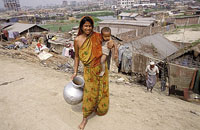International community can do nothing about world's poorest countries
Last week, United Nations published its regular report on the planet’s least developed countries. Frankly speaking, the report looks very much like usual with one exception only: this time the list of poorest countries consists of 49 countries instead of the 50 ones reported last year. Unfortunately, the report reveals that no matter what economic and scientific success mankind, and basically most developed and richest countries achieve, least developed countries gain nothing.

Every year the G8 leaders and participants of other important international summits promise to maintain and even increase the financial aid that the poorest countries so terribly need. However, the situation does not change radically. According to the UN Conference on Trade and Development (UNCTAD), countries with the annual income of residents equal or less than $750 per head are the poorest ones. In addition to annual income per head the Conference also considers a wide range of showings such as supply of foodstuff, medical aid provided to the population and number of educated and literate people.
According to the assessment system, majority of the poorest countries are in Africa, also in Asia, and Haiti is the only delegate of the Western Hemisphere. Each time this report appears it gives rise to criticism from those who strongly object to the methods of making such a report. Usually, the set of criteria employed for making the report is the basic object of criticism. The differences between countries’ domestic structure are not taken into consideration while making the report. Let us take India where the stratum of rich people is increasing every year, and the country demonstrates steady economic growth. But the stratum of the poor is still very big in India, and entire regions of the country are gripped with poverty, hunger and diseases. One can hardly believe that the poor territories may have something to do with the country that positions itself among the leaders of international relationship. Even if the set of criteria employed for making the list is imperfect the ranking of the least developed countries absolutely mirrors reality. This may sound strange but poor countries even seek inclusion into the list as it guarantees special preferential credits. Countries mentioned among the planet’s least developed are allowed to place their products on the perspective markets of Europe and America, they may also have easier procedures for getting patents and technologies.
But the situation has its reverse side. Let us assume that a country given the above mentioned privileges manages to succeed in increasing the annual income of its residents to more than $750 per head. Will this country be again deprived of the privileges until the incomes of its population drop to less than $750?
If we look at the UN list of the least developed countries we will see that some of the mentioned countries are not that poor. The life in the African countries of Angola, Sudan and the Democratic Republic of Congo is really very hard. But these countries have a unique development potential. Unfortunately, the United Nations avoid answering the question why the poorest countries are so poor, but the issue is essential from the political point of view.
Some of these countries can not live without support of monopolies, others fell victim of the cold war. Many countries are poor because of their authoritarian leaders and there is no keeping them in check (Sudan is a good example here). In any case, the stable poor condition of these countries is certainly destabilizing for the international relations. Time will come when the world’s leading powers will have to solve the problem otherwise it may have a negative effect for the entire of the planet.
Politcom
Translated by Maria Gousseva
Pravda.ru
Subscribe to Pravda.Ru Telegram channel, Facebook, RSS!


